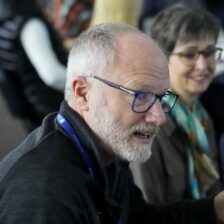 Matthew’s question to Madison: How is your current structured journey of doing a MTS degree enhancing your faith?
Matthew’s question to Madison: How is your current structured journey of doing a MTS degree enhancing your faith?
I wrote a blog a while ago on starting my Masters of Theology at Tyndale Seminary. Currently, I’m in the thick of only my second course for a Master’s of Theology. This course is on the book of Psalms, and workload has definitely been upped from doing an undergrad. Over the 12-weeks of the course, we have to write a reflection on all 150 psalms – that’s about 2-3 reflections a day. So there’s really no mental or time break from the course since you can’t afford to miss a day of reading and writing. Between the structure of my first course and this one, how have I noticed it enhancing my faith? The answer is two-fold – it has and it hasn’t. Let me start with how I’m noticing gaps, and then end off with how I have found it encouraging and enlightening.
With my current course, to write a reflection on each psalm, there’s a guiding question to answer after reading the commentary. When I first began, this whole process took an hour per psalm, but thankfully, that process has become more efficient. Since there are so many psalms to reflect on each day, this process has temporarily replaced opening my Bible and actively journaling throughout the week. Sure, when reading the commentary, I also read the psalm, but my focus is more on the words of the commentator than the psalm itself because I know that I have to write something for the assignment. Knowing this is just a season, and that it’s coming to an end soon, allows me to be okay with that since I’m still learning about who God is. But I have noticed a theme where the time I don’t open my Bible for a period of time my craving for it has increased.
Beyond that, this process has been incredibly beneficial to my spiritual life. I work really well within a structure, and the courses guide the direction I learn. Am I the only one who gets confused when choosing a book of the Bible to dive into for personal devotions? In the school setting, I find that I go deeper into that the topics or books we go through than I would ever go on my own. For example, the first course I took was Worship and Liturgy – I have learned so much about the Church, how the service can be structured to bring the congregation through a story, and how it is all an invitation from God. I now enter into church each weekend with a transformed perspective, especially taking note that I’m simply accepting God’s initiative, as well as noticing that I am not worshiping God alone, but with a whole group of people.
Through both of the courses so far, the main question that I’m finding being asked is, “What does this say about God’s character?” What an important question. We are nothing without Him, and I want to know more of who He is. And the more I go deeper into who He is, the more I fall in love with Him, and the more times I simply say “thank you” since there really are no other words to adequately express my gratitude.
I understand the academic world is not for everyone, and that is completely okay – we’re all wired differently, and we can all learn so much from one another. A mentor of mine showed me the 9 spiritual pathways, and ‘intellectual’ would be number 3 or 4 for me. That self-awareness, of how I connect best with God, encourages and challenges me to find the spaces that fit my top 3 so that I am continually and consistently in a setting where I feel connected with God – none of us want God to feel distant. That’s not to say we shouldn’t push ourselves to engage in the spaces that are less comfortable for us, but when we are actively in the spaces we feel closest to God, we have more energy to lean into the other practices.
Since ‘intellectual’ is high on my list, it makes sense for me to be in the academic world, and it also makes sense as to why the structure of the courses are drawing me closer to Him – it’s enhancing my faith.
To finish off, here are two questions to consider:
What are you learning about God’s character?
In what spaces do you feel most connected to God? And how can you actively move and live in those spaces?

